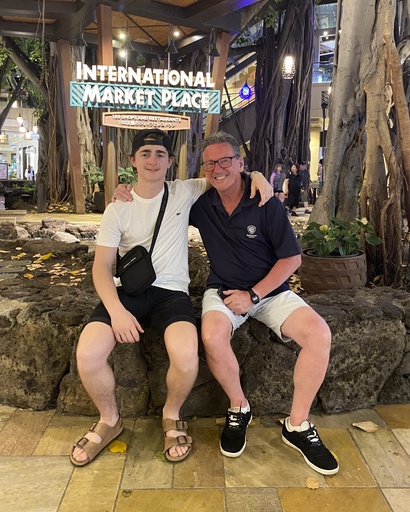
MELBOURNE, Australia — Wayne Holdsworth has emerged as a passionate advocate for prohibiting Australian children under the age of 16 from using social media, driven by the tragic loss of his son, Mac. Mac took his own life last year at their family home in Melbourne, following a harrowing experience with an online sextortion scheme perpetrated by a 47-year-old man who pretended to be an 18-year-old woman, extorting money in exchange for an explicit image Mac had shared.
Since this devastating event, Holdsworth has shared his family’s story at approximately 20 schools, educating students about the significant dangers that social media presents. He witnessed firsthand the severe impact that social media had on his son’s mental health. “I watched my son be sexually exploited online, and his mental wellbeing declined swiftly,” Holdsworth reflected. The predatory behavior targeting Mac began before he turned 16, and his father argues that implementing a social media ban could have potentially saved his life.
Recently, Australia’s House of Representatives voted to support this ban, with the Senate poised to enact it into law shortly. During his outreach, Holdsworth has spoken to around 3,000 students aged between 12 and 17, and reports that many express their support for such a regulation. “Students approach me and share their relief that this is being considered,” he stated, adding that even young people recognize the importance of protecting themselves from external threats.
He recounted a concerning incident where three girls confided in him after a school presentation about their experiences with sextortion. One of them had already given a blackmailer over 2,500 Australian dollars (equivalent to $1,600) from her parents’ finances. Holdsworth noted that he was the first adult to whom they opened up about their plight, emphasizing that such situations often remain unnoticed until it’s too late.
While Holdsworth describes the proposed social media ban as “crucial for the protection of children,” there are dissenting voices among parents and lawmakers regarding its effectiveness. Critics argue that the legislation was fast-tracked without sufficient examination and could have negative consequences, such as infringing on privacy for individuals of all ages and stripping parents of their authority in managing their children’s online activities.
Detractors further contend that such a ban may isolate children from beneficial aspects of social media, propel them toward more hidden corners of the internet, and create apprehension in reporting potential harms. Independent lawmaker Kylea Tink was the first representative to speak out against the bill, highlighting the importance of listening to young Australians during this legislative process. Tink, who voted against the bill, emphasized the need to consider the experiences and insights of young digital natives instead of assuming that older generations understand their challenges better.
The proposed legislation would hold social media platforms such as TikTok, Facebook, and Instagram accountable for hefty fines if they fail to prevent underage account holders. In response to the Senate committee review of the bill, social media companies have urged a postponement until an evaluation of age verification methods is finalized next June.
The committee meeting, which lasted four hours, received an impressive 15,000 written submissions. X Corp., owned by billionaire Elon Musk, raised concerns regarding the proposed law’s legal shortcomings and its alignment with global children’s rights agreements. The company stated, “There is no substantiated proof that banning young individuals from social media will be effective, and this law poses many complications.” Similarly, Meta, the owner of Facebook and Instagram, criticized the legislation for not resonating with the wishes of Australian parents, who reportedly prefer simpler solutions for managing their teenagers’ online activities.
Under the current proposal, parental consent will not exempt children from the ban, which has drawn additional criticism. Lizzie O’Shea, chair of the Digital Rights Watch charity, expressed her dismay at the rushed legislative process, arguing that while she recognizes the dangers posed by social media, a blanket ban might have its own set of issues. She raised concerns about the exclusion of children from online spaces, potential mental health repercussions, and suggested that kids might find even riskier ways to access social media.
Belinda Barnet, a digital media expert at Swinburne University, supports the ban, declaring that many social media platforms, as they are today, are unsuitable for young users. “I advocate for the ban because current social media environments can be harmful to young children,” Barnet stated, reflecting the challenging balance between safeguarding children and the digital landscape they inhabit.
